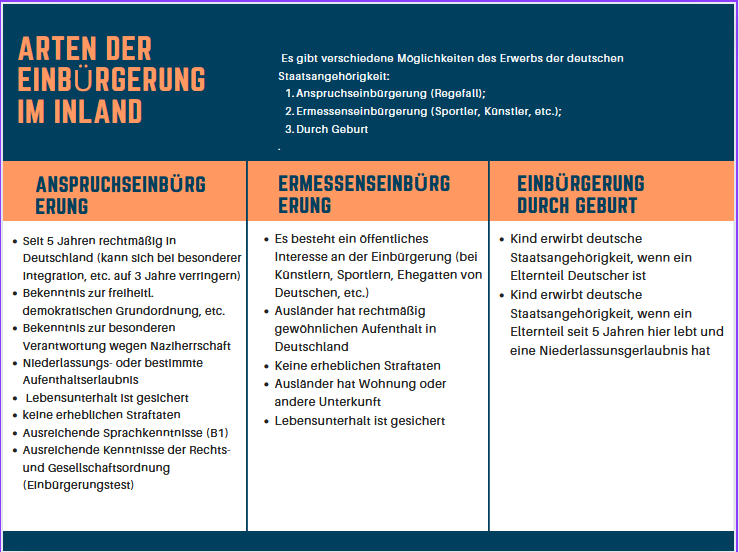Administrative Court of Augsburg, October 8, 2012, Case No.: 11 K 1376/12
According to § 8 Paragraph 1 of the German Nationality Act (StAG), a foreigner can be naturalized upon request if they have legally resided in Germany, are capable of acting according to § 37 Paragraph 1 Sentence 1 StAG or are legally represented, have not been convicted of a criminal offense, or subjected to measures of improvement and security due to their criminal incapacity, have found their own accommodation, and are able to support themselves and their dependents.
These requirements can be waived according to § 8 Paragraph 2 StAG for reasons of public interest or to avoid special hardship. Consequently, in cases where the capacity to act according to § 27 Paragraph 1 Sentence 1 StAG or legal representation is present but one of the other conditions is not met, the authority has the discretion to approve naturalization.
In a lawsuit challenging an administrative decision, the court examines whether the authority’s decision was free of errors in discretion or if there were errors that violated the plaintiff’s rights (§ 113 Paragraph 5, 114 VwGO). Errors in discretion are categorized into various types: non-use of discretion, exceeding discretion, misuse of discretion, and reduction of discretion to zero. For example, non-use of discretion occurs when the authority assumes that it was not granted any discretion by the legislator, although it was. Misuse of discretion occurs when the authority exercises its discretion, but incorrectly.
In this case, the plaintiff seeks a new decision on his naturalization application after the authority rejected it due to his criminal conviction.
Background and Entry of the Plaintiff – Facts
The plaintiff, a national of Bosnia and Herzegovina, entered Germany in 1993. In 1994, he married a fellow countrywoman who was later naturalized. They had two children, born in Germany, who hold German citizenship. The plaintiff initially received a temporary residence permit on December 10, 2003. This was replaced by a residence permit under § 30 of the Residence Act on November 5, 2009. Finally, he was granted a settlement permit on November 20, 2011, which secured his permanent residence rights in Germany.
Criminal Conviction and Initial Naturalization Application
On June 21, 2000, the plaintiff was convicted of multiple thefts, forgery, and aiding theft, and sentenced to two years in prison, which was suspended. The probation period was three years, and the sentence was ultimately discharged on July 31, 2003. Despite this conviction, the plaintiff first applied for naturalization in 2006. The naturalization authority clarified that due to the criminal conviction and the ongoing clearance period of the Federal Central Register, which lasted until 2015, his application could not be approved. Consequently, the plaintiff withdrew his application without a formal rejection.
Subsequent Naturalization Application and Rejection
In 2011, the plaintiff submitted another application for naturalization. This application was also rejected by the defendant, the responsible naturalization authority, on the grounds that the 2000 conviction continued to obstruct naturalization. The clearance period for the conviction had not yet expired, so a positive decision was not possible. The plaintiff appealed this decision, but the appeal was also rejected by the appeal decision dated March 27, 2012, for the same reason. The authority argued that naturalization was not possible as long as the conviction remained in the Federal Central Register and the clearance period had not expired.
Plaintiff’s Lawsuit Before the Administrative Court
On April 24, 2012, the plaintiff filed a lawsuit before the Administrative Court of Stuttgart. In his complaint, he argued that the refusal of naturalization was erroneous in its discretion. He contended that he had lived legally in Germany for almost 20 years and had behaved exemplary, apart from the 2000 conviction. Additionally, the sentence had been discharged in 2003, which should also be considered in the discretion. He criticized the authority for not considering a reduction in the clearance period, given that it was a first-time conviction and there was no risk of further crimes. He also pointed out the contradiction that he had been granted a settlement permit while his naturalization was denied. The plaintiff sought to have the appeal decision overturned and a new decision on his naturalization application.
Naturalization Authority’s Argument – Rejection Lawful
The naturalization authority maintained its decision and added that, in considering whether deviations from the clearance periods could be made, various factors needed to be considered. These included the severity and frequency of the offenses, the time elapsed since the last offense, the removal of previous negative circumstances, and the clearance date. Additionally, it needed to be assessed whether statelessness was at risk. Ultimately, the plaintiff was not sufficiently integrated into German society, as his criminal offenses demonstrated that he did not respect the legal order of the Federal Republic of Germany adequately. Therefore, there was not enough integration to justify an exception to the legal requirements. The authority emphasized that granting the settlement permit did not contradict the denial of naturalization, as the two decisions were based on different legal grounds and made by different authorities.
Administrative Court of Stuttgart’s Judgment
The Administrative Court of Stuttgart ruled in favor of the plaintiff and declared the decisions of the naturalization authority to be legally flawed. The court found that while the plaintiff did not have an entitlement to naturalization under § 10 Paragraph 1 No. 5 of the Nationality Act (StAG) due to the criminal conviction, the offense could not be disregarded under § 12a Paragraph 1 Sentence 1 StAG due to the severity of the sentence. Therefore, the authority’s discretion was not open in this respect.
However, discretionary naturalization under § 8 Paragraph 2 StAG was possible, allowing the authority to make an exceptional decision if reasons of public interest were present. This provision permits the authority to deviate from the legal requirements if required by public interest. In this case, although discretionary naturalization due to special hardship was not necessarily required, it was deemed necessary for reasons of public interest. This was particularly evident from the fact that the plaintiff’s entire immediate family consists of German citizens. The court referred to the constitutionally enshrined protection of the family under Article 6 Paragraph 1 of the Basic Law (GG) and emphasized that the plaintiff’s naturalization was in the interest of achieving uniform German citizenship within the family. Such unity was essential to ensure and strengthen family cohesion.
Required Re-Decision by the Authority
The Administrative Court concluded that the naturalization authority should have considered the principle of uniform citizenship within the family in its decision. Since the authority erroneously assumed that no discretion was available, there was a discretionary error. Therefore, the plaintiff was entitled to a new decision on his naturalization application, considering constitutional requirements and the special family situation. The appeal decision and the naturalization authority’s decision were to be annulled, and the plaintiff had the right to a new, error-free discretionary decision.

Source: Administrative Court Stuttgart
Important Note: The content of this article has been prepared to the best of our knowledge and belief. However, due to the complexity and constant evolution of the subject matter, we must exclude liability and warranty. Important Notice: The content of this article has been created to the best of our knowledge and understanding. However, due to the complexity and constant changes in the subject matter, we must exclude any liability and warranty.
If you need legal advice, please feel free to call us at 0221 - 80187670 or send us an email to info@mth-partner.de
Lawyers in Cologne advise and represent clients nationwide in immigration law.



